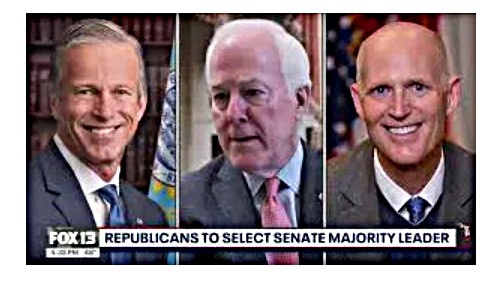How About Term Limits for the Majority Leader?
By Roger L Simon
The hills are alive not with the sound of music but with a brouhaha about who will be the next Senate Majority Leader.

It is the first ripple in the so far remarkably calm sea of the Trump transition that has been anything but the chaos of which our renewed president is typically accused. It’s clear he and his team have done a lot of careful planning resulting in smart choices.
The other side is vastly more chaotic with a number of Democrats from Jimmy Kimmel to some remarkably infantile women who are acting as if “The Handmaid’s Tale” is real life, shaving their heads and going on sexual strikes, the very definition of irrelevant. (PRO TIP: Aristophanes’ “Lysistrata” is a much better, and funnier, version.)
The actress Patricia Heaton has done a fine job of setting these ladies straight.
Meanwhile the brouhaha among Republicans over majority leader–that may have been decided by the time you read this–is a contest, as of now, among Senators John Thune (SD), John Cornyn (Tx) and Rick Scott (Fla).
To be honest, I don’t think any of these gentlemen are great shakes though Trump World from insiders like Elon and Vivek to the GOP rank and file across the country are favoring Scott. (I assume the across the country part because here in Nashville they have been organizing to push our Sen. Marsha Blackburn away from Thune and over to Scott.)
Brit Hume, representing a past that many of us wish we were rid of, has warned Trump World not to trample on the perquisites of the Senate. It would spell trouble ahead. The President will need them.
Thune himself said as much out loud, warning Mr. Trump to stay away from the contest. (I found that tactically dumb of the South Dakotan. People are watching in his home state where the new president, who just won a wave election, is hugely popular.)
The problem in all this is the Senate itself.
Said to be the “world’s greatest deliberative body”—a low bar if there ever was one—it comes off as a stuffed shirt society of lifetime politicians with little relationship to the people who elected them and more to what we might call the Washington Enrichment Complex.
There are exceptions, of course, but even they are trapped in a system in which money and longevity rule with power and cash doled out by a “leader.”
It is this Majority Leader who decides what legislation comes to the floor of the Senate and what doesn’t, speaking of power.
We are at one of those rare moments in history when some degree of governmental housecleaning–including, notably. a return to the principles of the Founders with some modern, shall we call them Muskian, variations—is possible.
One thing that should be up for consideration again—difficult as it is to obtain– is term limits.
This is a big ask—you might even say a huge ask—but particularly for Senators it is more than slightly worthy of consideration.
Presidents only get two terms. Some Senators remain in office longer than grey parrots stay alive. The longer they are in office, the more prey they are to their financial backers and the so-called political pros who are sustaining them in office while manipulating policy and image behind the scenes deliberately out of public view. (Some of these pros have become very rich.)
Again, this is a big ask because getting Senators to vote limits on themselves seems, to put it mildly, unlikely. Most of them are concerned about getting a better, more lavish, office next time.
While I was writing this, my wife and co-Substacker, Sheryl Longin, came up with a compromise suggestion.
What if those running to be Majority Leader were asked to sign a pledge that they would only serve two terms in that capacity?
I’m not sure how this would be managed, but if it could, it would at least put a small symbolic stake in the ground for eventual term limits.
Any other thoughts are welcome. But I would add one thing. This is only a brouhaha, defined as “a noisy and overexcited response to something.” Compared to Mr. Trump’s excellent appointments we are learning about, it is no more than its synonym, a “kerfuffle.”
But it is an opportunity to examine the Senate and how it functions. As they say in the I-Ching, “Change/opportunity.”
First published in American Refugees